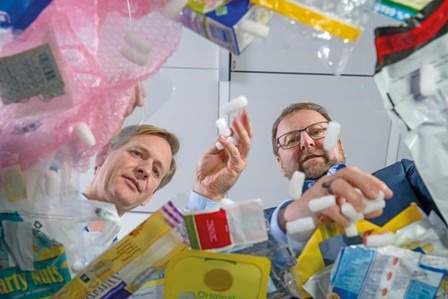German chemical company BASF has manufactured first products with chemically recycled plastics, as part of its ChemCycling project.

Image: Dr. Andreas Kicherer and Dr. Stefan Gräter talk about the different types of plastic waste and their recycling. Photo: courtesy of BASF SE.
ChemCycling project has been designed to reuse plastic waste such as mixed or uncleaned plastics, which are not currently recycled.
BASF will apply thermochemical processes to use plastics produced from the project for the production of syngas or oils.
The company will also use resulting recycled raw materials in its production by partially replacing fossil resources. BASF noted that it manufactured products based on chemically recycled plastic waste.
BASF chief technology officer and executive directors board chairman Dr Martin Brudermüller said: “A responsible use of plastics is crucial to solve the world’s waste problem. This applies to companies as well as to institutions and consumers. With chemical recycling we want to make a significant contribution in reducing the amount of plastic waste.”
BASF is already engaged in the development of pilot products, including mozzarella packaging, refrigerator components and insulation panels, with 10 customers from different industries.
The firm is also planning to commercialize the first products produced under ChemCycling project.
During the first stage of production chain, BASF is said to feed oil derived from plastic waste by an oiling process into the production Verbund.
Recenso, the company’s partner, supplies the feedstock required for the pilot products. The syngas made from plastic waste can also be used as an alternative.
In October this year, the first batch of this oil was filled into the steam cracker at BASF’s location in Ludwigshafen.
The primary products resulted from the process are ethylene and propylene, which are used in the Verbund to produce multiple chemical products.
BASF’s ChemCycling project head Stefan Gräter said: “This new way of recycling offers opportunities for innovative business models for us and our customers, who already place great value on products and packaging made from recycled materials but who cannot or do not want to make any compromises when it comes to quality.”
